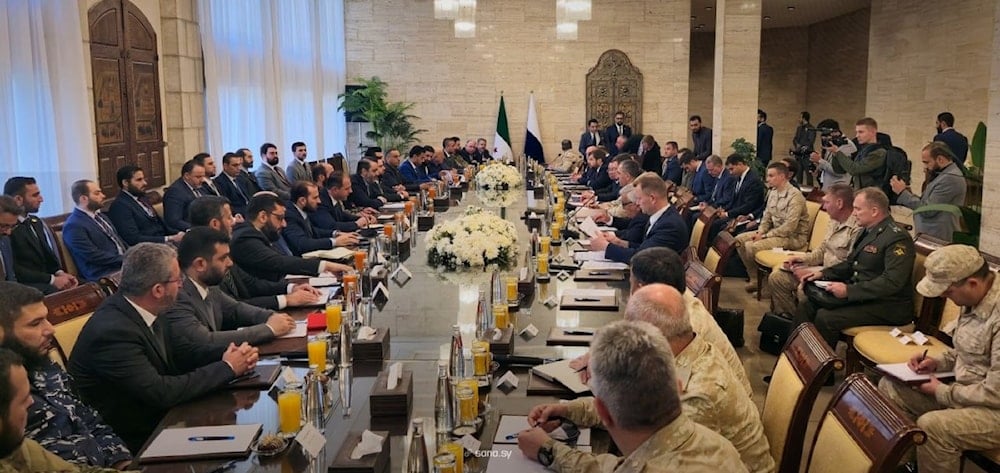Russia affirms 'new historic phase' in ties with Syria
Syrian FM Asaad al-Shaibani and Russian Deputy PM Alexander Novak pledged deeper cooperation in energy, reconstruction, and security while condemning Israeli aggression as a threat to regional stability.
-

Meeting between Syria's foreign minister and Russia's deputy prime minister at Tishreen Palace in Damascus (SANA)
Syrian Foreign Minister Asaad al-Shaibani met Russian Deputy Prime Minister Alexander Novak in Damascus on Tuesday. The talks, held at Tishreen Palace in the presence of senior officials, were framed as a "new historic phase" in bilateral relations.
At a joint press conference, al-Shaibani said Damascus was committed to "opening new relations with Russia, based on mutual respect." He added that Syria wanted Russia to remain "a positive partner, one that clearly stands by the unity of the country," and welcomed cooperation in reconstruction, energy, agriculture, and health "on a fair and transparent basis." Any foreign presence in Syria, he stressed, "must aim to help the Syrian people build their future."
The Syrian minister also addressed Israeli strikes on Syrian territory, describing them as "a direct threat to regional stability." He warned that "the chances of chaos and terrorism increase as Syria weakens, while opportunities for cooperation open up for everyone as it stabilizes," accusing "Israel" of seeking to impose "a partitionist reality" on the country.
Novak said his visit was aimed at strengthening cooperation in energy, agriculture, and security. He reaffirmed "the sovereignty and unity of Syrian territory," and noted that Moscow and Damascus were bound by "ties of friendship and partnership built on mutual respect." He noted that Russia placed special importance on Syrian President Ahmad al-Sharaa's upcoming trip to Moscow to attend the Russia-Arab summit in mid-October.
Shifting regional dynamics
The meeting comes against the backdrop of changing alliances since the collapse of Bashar al-Assad's government in 2024. The interim administration led by al-Sharaa has explored engagement with "Israel," though efforts have been undermined by mistrust.
Russia, meanwhile, has remained a central player. During the Assad era, Moscow was instrumental in keeping Damascus afloat, supplying military hardware, financial support, and launching a 2015 intervention that helped reclaim key cities such as Aleppo and Daraa.
Following al-Assad's fall, the Kremlin refrained from blocking the transition but offered him refuge. Since then, it has maintained pragmatic ties with the interim government, retaining its military presence at Hmeimim Air Base and Tartus Port while positioning itself as a guarantor of sovereignty and a partner in Syria's reconstruction.
Read more: Russia, Syria in talks to expand role of military bases

 3 Min Read
3 Min Read








